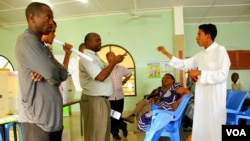Senior officials of Kenya’s Independent Electoral and Boundaries Commission (IEBC) plan to meet Thursday to review its performance following last month’s general election.
The meeting comes after judges of the Supreme Court recommended investigation and prosecution of any IEBC officers found responsible for failure of an electronic voter identification system during and after the balloting. Critics say the failures undermined the integrity of the voting results.
“We recommend that this matter be entrusted to the relevant state agency, for further investigation and possible prosecution of suspects,” the Supreme Court judges said.
In their ruling, the judges attributed the system failure to the misunderstandings and squabbles among officials of the electoral body during the equipment procurement process.
“One of the things we want to discuss is the way forward… [After] the Supreme Court ruling yesterday, we are still looking at that document and seeing some of the recommendations,” said IEBC Commissioner Yusuf Nzibo.
“We are still at the stage where we are now digesting quite a number of changes, some of which led to the challenges as a result of last minute amendments rules and regulations,” Nzibo said. “We will do our own internal evaluation and come up with a report in terms of what areas did we succeed, [or] areas of challenges. So we would come up with those investigations to find out how best we can improve for the next elections.”
He says the IEBC will focus on finding ways to improve on its performance during an election by seeking the expertise of its international partners.
“We would also want to do our own internal audit, including inviting the UNDP [United Nations Development Program] to help us with the auditing of the IT [Information Technology] system, to find out what were the challenges and how to overcome some of the failures that we did experience during the elections,” said Nzibo.
He says the electoral commission will learn from the experience of other countries that used the so-called biometric identification system in their elections.
“We will also talk to our sister organizations, like South Africa and Botswana, who have done a review of their general elections to see areas we can [improve] our management of elections to be able to deliver our mandate effectively,” said Nzibo.
The IEBC declared Uhuru Kenyatta president-elect with 50.07 percent of the March 4 vote, enough to avoid a runoff. Kenyatta is the son of the nation’s founder.
Former Prime Minister Raila Odinga and his Coalition for Reforms and Democracy (CORD) party have challenged the election results, citing what it said were voter irregularities. Odinga, however, said he accepted the ruling of the court after all of the six judges unanimously upheld Kenyatta’s victory.
The meeting comes after judges of the Supreme Court recommended investigation and prosecution of any IEBC officers found responsible for failure of an electronic voter identification system during and after the balloting. Critics say the failures undermined the integrity of the voting results.
“We recommend that this matter be entrusted to the relevant state agency, for further investigation and possible prosecution of suspects,” the Supreme Court judges said.
In their ruling, the judges attributed the system failure to the misunderstandings and squabbles among officials of the electoral body during the equipment procurement process.
“One of the things we want to discuss is the way forward… [After] the Supreme Court ruling yesterday, we are still looking at that document and seeing some of the recommendations,” said IEBC Commissioner Yusuf Nzibo.
“We are still at the stage where we are now digesting quite a number of changes, some of which led to the challenges as a result of last minute amendments rules and regulations,” Nzibo said. “We will do our own internal evaluation and come up with a report in terms of what areas did we succeed, [or] areas of challenges. So we would come up with those investigations to find out how best we can improve for the next elections.”
He says the IEBC will focus on finding ways to improve on its performance during an election by seeking the expertise of its international partners.
“We would also want to do our own internal audit, including inviting the UNDP [United Nations Development Program] to help us with the auditing of the IT [Information Technology] system, to find out what were the challenges and how to overcome some of the failures that we did experience during the elections,” said Nzibo.
He says the electoral commission will learn from the experience of other countries that used the so-called biometric identification system in their elections.
“We will also talk to our sister organizations, like South Africa and Botswana, who have done a review of their general elections to see areas we can [improve] our management of elections to be able to deliver our mandate effectively,” said Nzibo.
The IEBC declared Uhuru Kenyatta president-elect with 50.07 percent of the March 4 vote, enough to avoid a runoff. Kenyatta is the son of the nation’s founder.
Former Prime Minister Raila Odinga and his Coalition for Reforms and Democracy (CORD) party have challenged the election results, citing what it said were voter irregularities. Odinga, however, said he accepted the ruling of the court after all of the six judges unanimously upheld Kenyatta’s victory.





